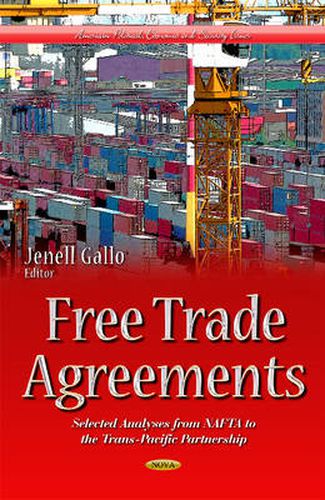Readings Newsletter
Become a Readings Member to make your shopping experience even easier.
Sign in or sign up for free!
You’re not far away from qualifying for FREE standard shipping within Australia
You’ve qualified for FREE standard shipping within Australia
The cart is loading…






The North American Free Trade Agreement (NAFTA) entered into force on January 1, 1994. The overall economic impact of NAFTA is difficult to measure since trade and investment trends are influenced by numerous other economic variables, such as economic growth, inflation, and currency fluctuations. NAFTA continues to be of interest to Congress because of the importance of Canada and Mexico as U.S. trading partners, and also because of the implications NAFTA has for U.S. trade policy. This book provides an overview of North American trade liberalisation before NAFTA, an overview of NAFTA provisions, the economic effects of NAFTA, and policy considerations. It also examines the provisions of the U.S.-South Korea Free Trade Agreement (KORUS FTA) in the context of the overall U.S.-South Korean economic relationship, U.S. objectives, and South Korean objectives. The book examines some of the issues that have arisen during the implementation of KORUS FTA, and analyses the issues related to the proposed Trans-Pacific Partnership (TPP), the state and substance of the negotiations, the specific areas under negotiation, the policy and economic contexts in which the TPP would fit, and the issues for Congress that the TPP presents.
$9.00 standard shipping within Australia
FREE standard shipping within Australia for orders over $100.00
Express & International shipping calculated at checkout
The North American Free Trade Agreement (NAFTA) entered into force on January 1, 1994. The overall economic impact of NAFTA is difficult to measure since trade and investment trends are influenced by numerous other economic variables, such as economic growth, inflation, and currency fluctuations. NAFTA continues to be of interest to Congress because of the importance of Canada and Mexico as U.S. trading partners, and also because of the implications NAFTA has for U.S. trade policy. This book provides an overview of North American trade liberalisation before NAFTA, an overview of NAFTA provisions, the economic effects of NAFTA, and policy considerations. It also examines the provisions of the U.S.-South Korea Free Trade Agreement (KORUS FTA) in the context of the overall U.S.-South Korean economic relationship, U.S. objectives, and South Korean objectives. The book examines some of the issues that have arisen during the implementation of KORUS FTA, and analyses the issues related to the proposed Trans-Pacific Partnership (TPP), the state and substance of the negotiations, the specific areas under negotiation, the policy and economic contexts in which the TPP would fit, and the issues for Congress that the TPP presents.